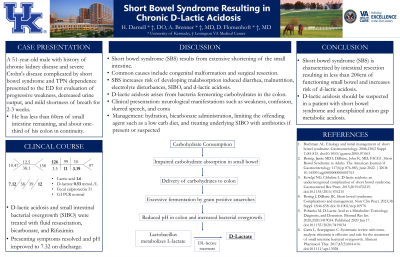Sunday Poster Session
Category: Small Intestine
P1534 - Short Bowel Syndrome Resulting in Chronic D-Lactic Acidosis
Sunday, October 27, 2024
3:30 PM - 7:00 PM ET
Location: Exhibit Hall E

Has Audio

Hannah Darnell, DO
University of Kentucky
Lexington, KY
Presenting Author(s)
Hannah Darnell, DO, Aaron Brenner, MD, Deborah Flomenhoft, MD
University of Kentucky, Lexington, KY
Introduction: D-lactic acidosis presents a unique challenge in patients with short bowel syndrome (SBS), a condition characterized by significant intestinal resection and dysfunction. This metabolic disorder arises from bacteria fermenting carbohydrates in the colon, leading to the accumulation of D-lactic acid beyond the body's capacity for clearance. The resulting acidosis can manifest with a spectrum of neurological symptoms, ranging from mild confusion and weakness to profound encephalopathy.
Case Description/Methods: We present a 51-year-old male patient with Crohn’s disease complicated by short bowel syndrome, total parenteral nutrition dependence, and recurrent small intestinal bacterial overgrowth (SIBO). He has less than 60cm of small intestine remaining distal to the ligament of Treitz, and about one-third of his colon in continuity. He presented with two weeks of weakness and severe anion gap metabolic acidosis. His venous blood gas was significant for pH 7.12, pCO2 38 mmHg, bicarbonate 12 mmol/L, and lactic acid of 1.6. Further evaluation revealed an elevated d-lactate of 0.53 mmol/L. He was treated with sodium bicarbonate infusion and started on Rifaximin for treatment of SIBO. After initiating Rifaximin, his pH improved to 7.32, and he was discharged on Rifaximin to complete a 14-day course.
Discussion: A high clinical suspicion for d-lactic acidosis should be maintained in patients with SBS if laboratory testing reveals an anion gap metabolic acidosis with normal L-lactate and no other obvious cause for acidosis. Management for d lactic acidosis takes on a multifaceted approach aimed at fixing the acidosis with fluid and bicarbonate infusions, correcting underlying electrolyte imbalances, implementing dietary changes, and providing supportive care to mitigate neurological symptoms. In patients with SBS complicated by SIBO the addition of an oral antibiotic such as rifaximin or metronidazole should be considered to reduce substrate for d-lactate production. Although rare, d-lactic acidosis is a known complication of SBS and poses risk of developing severe acidosis and encephalopathy. It is important for physicians to recognize the clinical nuances of d-lactic acidosis and specifically investigate this in patients with short bowel syndrome and unexplained anion gap metabolic acidosis for effective management and improved patient outcomes.
Disclosures:
Hannah Darnell, DO, Aaron Brenner, MD, Deborah Flomenhoft, MD. P1534 - Short Bowel Syndrome Resulting in Chronic D-Lactic Acidosis, ACG 2024 Annual Scientific Meeting Abstracts. Philadelphia, PA: American College of Gastroenterology.
University of Kentucky, Lexington, KY
Introduction: D-lactic acidosis presents a unique challenge in patients with short bowel syndrome (SBS), a condition characterized by significant intestinal resection and dysfunction. This metabolic disorder arises from bacteria fermenting carbohydrates in the colon, leading to the accumulation of D-lactic acid beyond the body's capacity for clearance. The resulting acidosis can manifest with a spectrum of neurological symptoms, ranging from mild confusion and weakness to profound encephalopathy.
Case Description/Methods: We present a 51-year-old male patient with Crohn’s disease complicated by short bowel syndrome, total parenteral nutrition dependence, and recurrent small intestinal bacterial overgrowth (SIBO). He has less than 60cm of small intestine remaining distal to the ligament of Treitz, and about one-third of his colon in continuity. He presented with two weeks of weakness and severe anion gap metabolic acidosis. His venous blood gas was significant for pH 7.12, pCO2 38 mmHg, bicarbonate 12 mmol/L, and lactic acid of 1.6. Further evaluation revealed an elevated d-lactate of 0.53 mmol/L. He was treated with sodium bicarbonate infusion and started on Rifaximin for treatment of SIBO. After initiating Rifaximin, his pH improved to 7.32, and he was discharged on Rifaximin to complete a 14-day course.
Discussion: A high clinical suspicion for d-lactic acidosis should be maintained in patients with SBS if laboratory testing reveals an anion gap metabolic acidosis with normal L-lactate and no other obvious cause for acidosis. Management for d lactic acidosis takes on a multifaceted approach aimed at fixing the acidosis with fluid and bicarbonate infusions, correcting underlying electrolyte imbalances, implementing dietary changes, and providing supportive care to mitigate neurological symptoms. In patients with SBS complicated by SIBO the addition of an oral antibiotic such as rifaximin or metronidazole should be considered to reduce substrate for d-lactate production. Although rare, d-lactic acidosis is a known complication of SBS and poses risk of developing severe acidosis and encephalopathy. It is important for physicians to recognize the clinical nuances of d-lactic acidosis and specifically investigate this in patients with short bowel syndrome and unexplained anion gap metabolic acidosis for effective management and improved patient outcomes.
Disclosures:
Hannah Darnell indicated no relevant financial relationships.
Aaron Brenner indicated no relevant financial relationships.
Deborah Flomenhoft indicated no relevant financial relationships.
Hannah Darnell, DO, Aaron Brenner, MD, Deborah Flomenhoft, MD. P1534 - Short Bowel Syndrome Resulting in Chronic D-Lactic Acidosis, ACG 2024 Annual Scientific Meeting Abstracts. Philadelphia, PA: American College of Gastroenterology.
